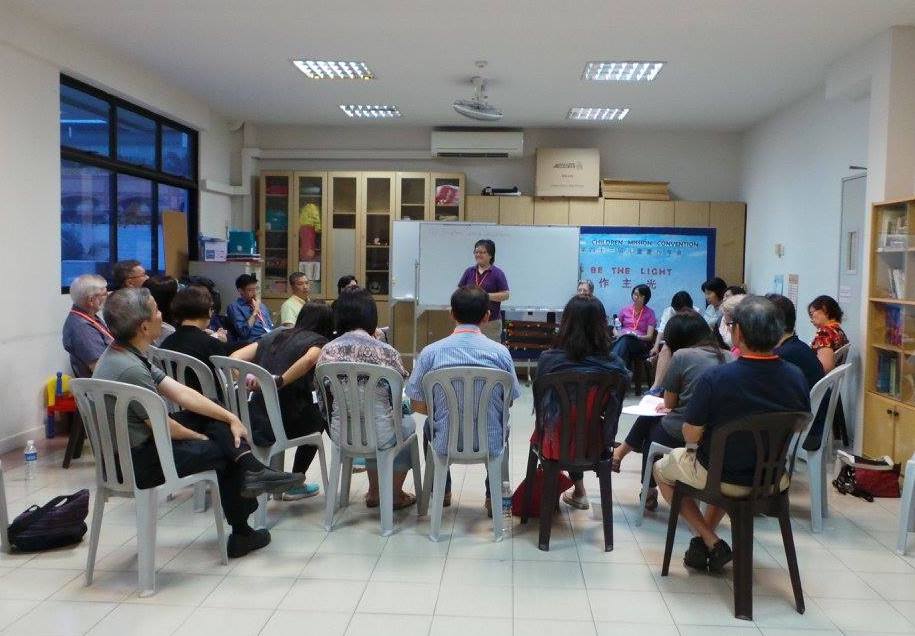Wycliffe translates the Word to transform the world
by Tan Huey Ying // July 18, 2019, 12:50 am

Photo of a Bible in an African language by Gift Habeshaw on Unsplash.
“Hi, I’m David Tan.”
“David … ten?”
“No, tah-n.“
If you’re Singaporean (or Malaysian), it would be easy to hear, in your head, how this exchange had sounded.
Dr David Tan, Executive Director of Wycliffe Singapore, introduced himself at a phonetics course in 2002. The trainer, who was of Caucasian descent, couldn’t quite catch Tan’s pronunciation of his name the first time.
But he was determined to.
Having spent several years in the United Kingdom, Tan was used to his name being pronounced differently so he was surprised and mildly amused at the effort that the trainer was putting in to “get it right”.
Tan soon realised why that mattered so much.
Heart language
“I only spoke Hokkien for the first six years of my life,” he told Salt&Light. “In those days, if you’re poor, you don’t go to kindergarten.”
Tan went straight to Primary 1 where he learnt English and Mandarin. But he was a Hokkien-speaker through and through. The years he spent in the UK did nothing to erase his heavily-nasalised intonation which was the influence of his Hokkien roots. (Hokkien is a language with a liberal bank of nasalised vowels such as png, which means rice.)
The Gospel, when translated into the heart language of a people, says: “God speaks your language.”
The language that you grow up with as a child is a strong indicator of your social status and there is an element of judgment – mostly unfair – associated with it.
Tan had felt the reality of this social stigma; in school, his “Hokkien-ness” had been looked down upon. So, while it had no bearing on his eventual academic achievements and his career, he never fully embraced his identity as a Hokkien-speaker.
The first time that his “heart language” was accorded with respect by his phonetics trainer, Tan realised that his own experience was a small reflection of what speakers of “minority languages” go through.
The Bible translation work that Wycliffe was doing had always made sense. But it suddenly resonated on a much deeper level.
The God who does not eat alone
Reaching people in their own language means more to them because this basic respect accorded to each one speaks of a sense of value, worth and status. It conveys the message: You matter.
Christianity, unlike other religions, was meant to be translated. Not just in language but in terms of culture.
Words carry different connotations in various languages, so the same concept might be explained differently depending on the language used. The depth of their ministry is limited by the understanding of culture and language.
This is the experience of missionaries, including Bible translators, across the world.
Amongst the Makonde people in Moçambique, for example, generosity and sharing are the key values held above all else. So calling someone a person who eats alone is one of the biggest insults you can give.
The love of God in John 3:16 was thus the most generous act of God toward all of mankind and the New Testament translation displayed a God who, like the Makonde people, values generosity and sharing.
At the Bible dedication ceremony in 2014, a Makonde translator shared their insight of God: “Our God is not a grasping God. He is not a keep-it-to-yourself God. Because of His love for us, and His desire to bring us to heaven, He did not hang on to his Son. Truly our God does not eat alone.”

Photo of a Bible dedication ceremony on Romblon Island, Philippines, in April 2019. In the 1990s, the late Phyllis Rappa, a Singaporean missionary, together with several local and foreign translators, worked together to translate the Bible into Romblomanon, the local language. Photo courtesy of Wycliffe Singapore.
The Gospel, when translated into the heart language of a people, says: “God speaks your language.” And they understand His character better, said Tan.
That is how the Gospel takes root because Christianity, unlike other religions, was meant to be translated. Not just in language but in terms of culture.
Only then does it transform people and cultures from the inside out.
Changing times
This is central to the work that Wycliffe engages in: Translating the Bible with an understanding of the culture of those whom it is meant for, and then discipleship through Scripture engagement.
In the past, the job of Bible translators used to be a linear process: Get to an inaccessible and remote village. Live there, learn their culture and language. Translate the Bible with the help of native-speakers. Check, proof-read, print and then use the translation to teach and disciple the community.
Wycliffe’s Bible translators take on the role of spiritual parenting to new believers.
Each project, usually consisting of the New Testament and several other key books of the Old Testament, would take at least 10 years to complete.
Times have changed, however.
Isolated communities are few and far between and most people within the community can at least speak the national language. Technology and even socio-economic trends have impacted everything from physical accessibility to education.
“We are not living in the Stone Age anymore,” Tan noted, adding that younger generations are also better educated than before.
The key task at hand is still translation, he said. But the subtasks of use and distribution happen in smaller and faster cycles.
The moment some chapters of the Bible have been translated – often by native-speakers who also speak the national language, you can get it printed, recorded into audio or visual format and then disseminated while the translation continues.
From translators to church planters
The role and work of a Bible translator has become something closer to that of a trainer and facilitator – sometimes even church-planter – varying with the political, social and religious contexts that they are placed in, from “open” countries like the Philippines, to other places known for their strict rules and limited freedom of religion.
The power of the Word means that native-speakers who are involved in the translation work almost always become followers of Christ as well.
Through daily and close interaction, Wycliffe’s Bible translators take on the roles of spiritual parenting to these new believers. They build spiritual disciplines, create small Bible study or “Bible-storying” groups that help believers mature in the faith.

A bible-storying workshop held by Wycliffe in 2016. Photo courtesy of Wycliffe Singapore.
Naturally, the need for other materials that facilitate engagement with Scripture grows. Bible study materials, teaching videos and even songs have to be created – alongside the ongoing Bible translation.
Tan, himself, has seen how a church is built as a by-product of translation efforts.
A native speaker who came to Christ as a result of being involved in the translation process had the apparent gift of evangelism. Through her, the small gathering of believers quickly blossomed into a fellowship of over 50 people.
Another native speaker was a young believer when Tan started working with him. But as Tan discipled the man over four years, he soon served as a key leader in the same fellowship.
The Word at work
To date, at least 1.5 billion people still do not have the Bible translated in their language and there are about 2,000 languages where no Bible translation work has even begun. But more than 2,500 languages have “active translation and linguistic development work” that is ongoing.
One day there will be “a great multitude that no one could number, from every nation, from all tribes and peoples and languages, standing before the throne and before the Lamb” (Revelations 7:9).
Despite the change in the nature of the mission fields, Wycliffe’s raison d’etre remains:
Translate the Word, transform the world. One life and one tongue at a time.
We are an independent, non-profit organisation that relies on the generosity of our readers, such as yourself, to continue serving the kingdom. Every dollar donated goes directly back into our editorial coverage.
Would you consider partnering with us in our kingdom work by supporting us financially, either as a one-off donation, or a recurring pledge?
Support Salt&Light


